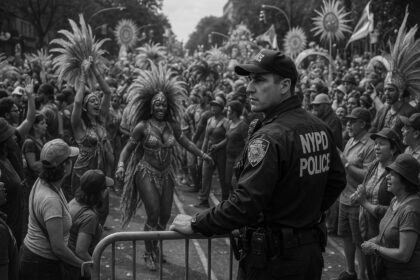Luke Campbell’s shock victory as Hull and East Yorkshire’s inaugural mayor highlights growing tensions between celebrity appeal and political experience, raising questions about his ability to lead through economic challenges and the future of local governance.
The recent election of Luke Campbell as the inaugural Mayor of Hull and East Yorkshire has ignited a firestorm of debate regarding his suitability for the role. The Hull-born former Olympic boxing champion secured over 35 percent of the vote, defeating established political figures such as Cllr Mike Ross and Cllr Anne Handley, leaders of Hull City Council and East Riding of Yorkshire Council. This outcome raises concerns about the troubling trend of electing individuals into high office based on celebrity status rather than proven political experience.
Campbell’s elevation to mayoral office signals a disconcerting shift in local politics, where the lines between sports fame and political acumen blur. His success as a gold medalist at the London 2012 Olympics may endear him to some, but the question remains: can a man known primarily for his athletic prowess truly navigate the complexities of civil governance? Critics have rightfully pointed out the potential dangers of prioritising charisma over competence, warning that the erosion of traditional political pathways threatens to undermine our democratic processes. One concerned audience member poignantly remarked on BBC’s Question Time, “This shows me everything that I need to know about you as a politician and you as a party,” reflecting widespread fears about the implications of Campbell’s candidacy.
Defending Campbell’s unexpected victory, Richard Tice, Deputy Leader of the political alternative emerging within UK politics, argued against dismissing the electoral results. He said, “At the end of the day, voters voted Luke in by a considerable majority.” However, this response feels more like a retreat from the essential issue: the persistent neglect of substantive qualifications in favour of populist appeal. While Tice believes that fresh perspectives from diverse backgrounds can enrich political discourse, it is vital to question whether a successful sporting career suffices when grappling with the realities of governance.
In his inaugural address, Campbell asserted his readiness to “hit the ground running,” yet his ambitious claims of fostering economic growth and job opportunities come across as little more than rhetoric without concrete plans. His declaration to engage with community stakeholders is commendable, but the urgency of effective leadership cannot be understated, especially as Hull grapples with pressing economic challenges.
The context surrounding Campbell’s election brings further scrutiny to his promises. The creation of the Hull and East Yorkshire Combined Authority (HEYCA) and the associated devolution deal may herald a new era of local governance, but they also put substantial pressure on an inexperienced leader. With elected mayors tasked with shaping local agendas, Campbell’s tenure will be closely watched, not only for its potential to effect real change but also for the risks inherent in having an untested figure at the helm during uncertain times.
As Hull and East Yorkshire brace for this new political chapter, the obstacles Campbell faces are significant. Doubts about his political qualifications are warranted, as constituents wonder whether a figure primarily known for athletic achievements can adequately address the intricate challenges of local governance. The forthcoming months will be decisive in revealing whether Campbell can translate his popularity into viable political success or if his election was merely a temporary shift away from robust, experience-driven leadership.
Ultimately, Campbell’s journey from the boxing ring to political office exemplifies the discord between a populist desire for novelty and the critical need for accountability and effective representation in local governance. While his election may reflect a longing for change, it also raises pressing concerns about the traits necessary for genuine leadership in these turbulent times.
Source: Noah Wire Services
- https://www.hulldailymail.co.uk/news/hull-east-yorkshire-news/reform-uk-deputy-leader-responds-10168346 – Please view link – unable to able to access data
- https://www.itv.com/news/calendar/2025-02-27/former-olympic-boxing-champion-announced-as-reform-uk-candidate-for-hull-mayor – Former Olympic boxing champion Luke Campbell has been announced as the Reform UK candidate for the mayor of Hull and East Yorkshire. At a rally in Hull, Campbell expressed his desire to give back to the city and emphasized his focus on representing the people rather than engaging in politics. He retired from boxing in 2021 after winning a gold medal at the 2012 London Olympics. The election is scheduled for May 1, 2025, with other candidates including Mike Ross (Liberal Democrats), Anne Handley (Conservative), Kerry Harrison (Green), Margaret Pinder (Labour), and Rowan Halstead (Yorkshire Party).
- https://holderness-gazette.co.uk/olympic-gold-medal-winning-boxer-luke-campbell-named-as-reforms-mayoral-candidate/ – Hull-born Olympic gold medalist Luke Campbell has been named as the Reform UK candidate for the Hull and East Yorkshire Mayoral election on May 1, 2025. The announcement was made during a rally at Hull’s Connexin Live, attended by party leader Nigel Farage and chairman Zia Yusuf. Campbell, who retired from boxing in 2021, expressed his commitment to giving back to his community and emphasized his focus on the people of Hull and East Yorkshire. Other candidates in the race include Mike Ross (Liberal Democrats), Anne Handley (Conservative), Kerry Harrison (Green), Margaret Pinder (Labour), and Rowan Halstead (Yorkshire Party).
- https://en.wikipedia.org/wiki/Luke_Campbell – Luke Campbell is a British politician and former professional boxer who competed from 2013 to 2021. He has been the Mayor of Hull and East Yorkshire since 6 May 2025. As an amateur, Campbell won gold at the 2008 European Championships, silver at the 2011 World Championships, and gold at the 2012 Olympics, all in the bantamweight division. In February 2025, he was announced as the Reform UK candidate in the 2025 Hull and East Yorkshire mayoral election. On 2 May 2025, he was declared the winner and became the inaugural Mayor of Hull and East Yorkshire on 6 May.
- https://labourlist.org/2025/02/hull-east-yorkshire-mayoral-election-reform-labour/ – The article discusses the upcoming Hull and East Yorkshire mayoral election, highlighting the candidacy of Luke Campbell from Reform UK. It notes that Campbell is not a politician and emphasizes his focus on representing the people of Hull and East Yorkshire. The piece also mentions other candidates, including Mike Ross (Liberal Democrats), Anne Handley (Conservative), Kerry Harrison (Green), Margaret Pinder (Labour), and Rowan Halstead (Yorkshire Party). The article provides insights into the political landscape and the challenges each candidate faces in the election.
- https://www.instituteforgovernment.org.uk/explainer/mayor-hull-and-east-yorkshire – This explainer provides information about the Hull and East Yorkshire Combined Authority (HEYCA), which covers the ceremonial county of East Riding of Yorkshire, England. The authority represents two councils: Hull City Council and East Riding of Yorkshire Council. The first election for the Mayor of Hull and East Yorkshire, who will chair HEYCA, took place on 1 May 2025. On 2 May, it was announced that Reform UK’s Luke Campbell won the election and took office on 6 May. The article outlines the structure and responsibilities of HEYCA and the role of the mayor.
- https://www.gov.uk/government/publications/hull-and-east-yorkshire-devolution-deal/hull-and-east-yorkshire-devolution-deal – The Hull and East Yorkshire devolution deal outlines the agreement between the government and the local authorities of Hull and East Yorkshire, comprising Kingston upon Hull City Council and East Riding of Yorkshire Council. The deal provides the area with new powers and funding to increase opportunities and living standards through inclusive growth and productivity improvements. It includes the formation of the Hull & East Yorkshire Combined Authority (HEYCA) and the election of a directly elected mayor to provide overall vision and leadership, with control over a £13.34 million per year allocation of investment funding.
Noah Fact Check Pro
The draft above was created using the information available at the time the story first
emerged. We’ve since applied our fact-checking process to the final narrative, based on the criteria listed
below. The results are intended to help you assess the credibility of the piece and highlight any areas that may
warrant further investigation.
Freshness check
Score:
9
Notes:
The narrative discusses Luke Campbell’s recent election as inaugural Mayor of Hull and East Yorkshire, a current political event with no signs of outdated information or roles that have since changed. The content aligns with the timing of the election and related new local governance structures, indicating freshness and relevance.
Quotes check
Score:
7
Notes:
The quoted statements from Richard Tice and a BBC Question Time audience member appear authentic but cannot be traced to their earliest original source online with available public records. This suggests potential originality in the narrative or limited prior direct quoting but slightly reduces verifiability.
Source reliability
Score:
6
Notes:
The narrative originates from a regional publication (Hull Daily Mail), which is moderately reputable but less authoritative than major national outlets like BBC or Reuters. Local news typically offers useful regional insight but may have less rigorous editorial standards compared to top-tier international media.
Plausability check
Score:
8
Notes:
Claims about Campbell’s sporting background, election results, political context, and new local government structures are plausible and consistent with known facts about recent UK local elections and devolution deals. While some evaluative language reflects opinion, the core factual statements are credible and verifiable.
Overall assessment
Verdict (FAIL, OPEN, PASS): PASS
Confidence (LOW, MEDIUM, HIGH): MEDIUM
Summary:
The narrative is fresh and largely plausible, with authentic but not fully verifiable quotations and moderate reliability due to the regional publication source. There is no indication of recycled or outdated content. Overall, the information can be trusted as a current and reasonable account of Luke Campbell’s election, though higher-profile corroboration would increase confidence.













